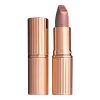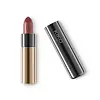What's inside
What's inside
 Key Ingredients
Key Ingredients

 Benefits
Benefits

 Concerns
Concerns

 Ingredients Side-by-side
Ingredients Side-by-side

Neopentyl Glycol Dicaprylate/Dicaprate
EmollientTrimethylolpropane Triisostearate
EmollientDimethicone
EmollientMicrocrystalline Wax
Emulsion StabilisingPolyethylene
AbrasivePolybutene
Dicalcium Phosphate
AbrasiveDimethicone Crosspolymer
Emulsion StabilisingSilica
AbrasiveMica
Cosmetic ColorantEthyl Vanillin
MaskingCaprylic/Capric Triglyceride
MaskingTocopherol
AntioxidantCarthamus Tinctorius Seed Oil
MaskingZea Mays Oil
EmulsifyingPentaerythrityl Tetra-Di-T-Butyl Hydroxyhydrocinnamate
AntioxidantCarica Papaya Fruit Extract
Skin ConditioningPhalaenopsis Amabilis Extract
HumectantBixa Orellana Seed Extract
MaskingBHT
AntioxidantTocopheryl Acetate
AntioxidantTin Oxide
AbrasiveCI 77891
Cosmetic ColorantIron Oxides
CI 75470
Cosmetic ColorantCI 15850
Cosmetic ColorantCI 19140
Cosmetic ColorantCI 15985
Cosmetic ColorantCI 77742
Cosmetic ColorantCI 77163
Cosmetic ColorantCI 73360
Cosmetic ColorantCI 45380
Cosmetic ColorantCI 45410
Cosmetic ColorantCI 42090
Cosmetic ColorantNeopentyl Glycol Dicaprylate/Dicaprate, Trimethylolpropane Triisostearate, Dimethicone, Microcrystalline Wax, Polyethylene, Polybutene, Dicalcium Phosphate, Dimethicone Crosspolymer, Silica, Mica, Ethyl Vanillin, Caprylic/Capric Triglyceride, Tocopherol, Carthamus Tinctorius Seed Oil, Zea Mays Oil, Pentaerythrityl Tetra-Di-T-Butyl Hydroxyhydrocinnamate, Carica Papaya Fruit Extract, Phalaenopsis Amabilis Extract, Bixa Orellana Seed Extract, BHT, Tocopheryl Acetate, Tin Oxide, CI 77891, Iron Oxides, CI 75470, CI 15850, CI 19140, CI 15985, CI 77742, CI 77163, CI 73360, CI 45380, CI 45410, CI 42090
Di-C12-13 Alkyl Tartrate
EmollientOctyldodecanol
EmollientMyristyl Trisiloxane
EmollientCetyl Dimethicone
EmollientPolyethylene
AbrasiveCaprylic/Capric Triglyceride
MaskingCera Microcristallina
Emulsion StabilisingC30-45 Alkyl Dimethicone
Skin ConditioningMica
Cosmetic ColorantTalc
AbrasiveStearalkonium Bentonite
Gel FormingDicalcium Phosphate
AbrasivePropylene Carbonate
SolventSynthetic Fluorphlogopite
Ethyl Vanillin
MaskingCaprylyl Methicone
Skin ConditioningZea Mays Oil
EmulsifyingEthylhexyl Palmitate
EmollientPhalaenopsis Amabilis Extract
HumectantPentaerythrityl Tetra-Di-T-Butyl Hydroxyhydrocinnamate
AntioxidantTrihydroxystearin
Skin ConditioningCentella Asiatica Extract
CleansingSodium Hyaluronate
HumectantGlucomannan
Skin ConditioningTocopheryl Acetate
AntioxidantBHT
AntioxidantTin Oxide
AbrasiveCI 77891
Cosmetic ColorantCI 77491
Cosmetic ColorantCI 77947
CI 75470
Cosmetic ColorantCI 15850
Cosmetic ColorantCI 42090
Cosmetic ColorantCI 45380
Cosmetic ColorantCI 45410
Cosmetic ColorantDi-C12-13 Alkyl Tartrate, Octyldodecanol, Myristyl Trisiloxane, Cetyl Dimethicone, Polyethylene, Caprylic/Capric Triglyceride, Cera Microcristallina, C30-45 Alkyl Dimethicone, Mica, Talc, Stearalkonium Bentonite, Dicalcium Phosphate, Propylene Carbonate, Synthetic Fluorphlogopite, Ethyl Vanillin, Caprylyl Methicone, Zea Mays Oil, Ethylhexyl Palmitate, Phalaenopsis Amabilis Extract, Pentaerythrityl Tetra-Di-T-Butyl Hydroxyhydrocinnamate, Trihydroxystearin, Centella Asiatica Extract, Sodium Hyaluronate, Glucomannan, Tocopheryl Acetate, BHT, Tin Oxide, CI 77891, CI 77491, CI 77947, CI 75470, CI 15850, CI 42090, CI 45380, CI 45410
 Reviews
Reviews

Ingredients Explained
These ingredients are found in both products.
Ingredients higher up in an ingredient list are typically present in a larger amount.
BHT is a synthetic antioxidant and preservative.
As an antioxidant, it helps your body fight off free-radicals. Free-radicals are molecules that may damage your skin cells.
As a preservative, it is used to stabilize products and prevent them from degrading. Specifically, BHT prevents degradation from oxidation.
The concerns related to BHT come from oral studies; this ingredient is currently allowed for use by both the FDA and EU.
However, it was recently restricted for use in the UK as of April 2024.
Learn more about BHTThis ingredient is an emollient, solvent, and texture enhancer. It is considered a skin-softener by helping the skin prevent moisture loss.
It helps thicken a product's formula and makes it easier to spread by dissolving clumping compounds.
Caprylic Triglyceride is made by combining glycerin with coconut oil, forming a clear liquid.
While there is an assumption Caprylic Triglyceride can clog pores due to it being derived from coconut oil, there is no research supporting this.
Learn more about Caprylic/Capric TriglycerideCi 15850 is the pigment color red. It is an azo dye and created synthetically.
Azo dyes need to be thoroughly purified before use. This allows them to be more stable and longer-lasting.
This ingredient is common in foundations, lipsticks, and blushes. This color is described as brown/orangey red.
It has many secondary names such as Red 6 and Red 7. According to a manufacturer, Red 6 usually contains aluminum.
Learn more about CI 15850Ci 42090 is a synthetic dye created from petroleum. It is used to give a bright blue color to cosmetics, medicine, and food.
Ci 45380 is a synthetic dye that comes from coal or tar sources. Due to this, it is often used in small quantities.
A common name for this dye is Red 22. Red 22 imparts a warm reddish color.
Similar to Red 27, this dye changes color based on pH and moisture levels.
This dye is colorless when dry but turns pink between pH levels 0.0 to ~3.0.
Learn more about CI 45380CI 45410 is a synthetic red-pigment and dye.
It often goes by both Red 28 or Red 27; manufacturers label both ingredients as CI 45410.
This dye is commonly found in makeup because it imparts a vivid color. Some types of this dye change color based on pH level and interaction with moisture:
Your skin has a natural pH of around 4.5 - 5.5.
According to the FDA, CI 45410 is not permitted for use in eye products.
Red 27 is a flourescein dye and commonly used as a fluorescent tracer in medicine.
Learn more about CI 45410Ci 75470 is a bright-red pigment. It is AKA carmine.
Carmine is derived from insects such as the cochineal beetle. This ingredient has been used as a natural dye for over 2000 years.
Ci 77891 is a white pigment from Titanium dioxide. It is naturally found in minerals such as rutile and ilmenite.
It's main function is to add a white color to cosmetics. It can also be mixed with other colors to create different shades.
Ci 77891 is commonly found in sunscreens due to its ability to block UV rays.
Learn more about CI 77891Dicalcium Phosphate is an exfoliant.
We don't have a description for Ethyl Vanillin yet.
Mica is a naturally occurring mineral used to add shimmer and color in cosmetics. It can also help improve the texture of a product or give it an opaque, white/silver color.
Serecite is the name for very fine but ragged grains of mica.
This ingredient is often coated with metal oxides like titanium dioxide. Trace amounts of heavy metals may be found in mica, but these metals are not harmful in our personal products.
Mica has been used since prehistoric times throughout the world. Ancient Egyptian, Indian, Greek, Roman, Aztec, and Chinese civilizations have used mica.
Learn more about MicaPentaerythrityl Tetra-Di-T-Butyl Hydroxyhydrocinnamate (long name, huh?) is a synthetic antioxidant.
It is used to help stabilize other antioxidants or prevent the color from changing in a product.
As an antioxidant, it helps fight free-radical molecules. Free-radical molecules are capable of damaging our cells and other genetic material. Thus, antioxidants may reduce the signs of aging.
This ingredient is oil-soluble.
Learn more about Pentaerythrityl Tetra-Di-T-Butyl HydroxyhydrocinnamateWe don't have a description for Phalaenopsis Amabilis Extract yet.
Polyethylene is a synthetic ingredient that helps the skin retain moisture. It is a polymer.
It is also typically used within product formulations to help bind solid ingredients together and thicken oil-based ingredients. When added to balms and emulsions, it helps increase the melting point temperature.
Tin Oxide is an inorganic oxide used to add opacity and volume to a product. In nature, it is already found in mineral form. The main ore of tin is an opaque and shiny mineral called casseterite.
Tin Oxide helps remove translucency in a product, or make it more opaque. Besides adding opacity, tin oxide is used for bulking to add volume.
Tocopheryl Acetate is AKA Vitamin E. It is an antioxidant and protects your skin from free radicals. Free radicals damage the skin by breaking down collagen.
One study found using Tocopheryl Acetate with Vitamin C decreased the number of sunburned cells.
Tocopheryl Acetate is commonly found in both skincare and dietary supplements.
Learn more about Tocopheryl AcetateZea Mays Oil is refined oil. It is created from the process of wet milling corn, or zea mays. Zea Mays Oil is fragrance ingredient, hair conditioning agent, occlusive skin conditioning agent, surfactant, and emulsifying agent.
It is composed of several fatty acids, including myristic, palmitic, stearic, oleic, and linoleic.